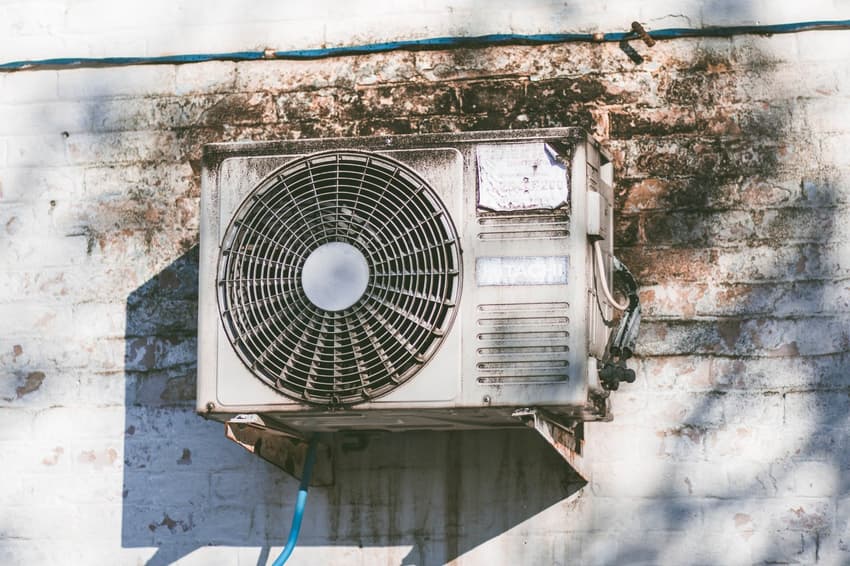How Italy plans to cut air conditioner use to save energy

In a move to cut energy consumption and help end reliance on Russian gas, the Italian government has approved plans to restrict the use of air conditioning from May.
The Italian government on Thursday approved new limits on the use of air conditioning in public offices and schools from May 1st, as the country looks at new was to save energy and help waan itself off a heavy reliance on Russian gas imports.
READ ALSO: Italy will ‘soon’ stop buying gas from Russia, says minister
The move came via an amendment made on Thursday to the national energy decree, imposing temperature limits for radiators and air conditioners in public offices and schools.
While it is not yet law, the amendment has been approved by the government's environment and business committee.
The Italian government said it aims to save 4 billion cubic metres of gas in 2022 by cutting the use of air conditioners in public buildings as part of its 'operation thermostat'.
Ministers said on Thursday that Italy will be able to end its reliance on Russian gas within 18 months, after previously giving a timeframe of at least two years.
The government is pushing to diversify gas supplies after Italy's prime minister talked earlier this month of the "question between peace and having working radiators, or air conditioning in summer".
The new rules on air conditioning are due to come into force on May 1st and will remain in place until March 31st 2023, according to Italian newspaper Corriere della Sera.
In public buildings, usage will be measured in the individual rooms of each building - the temperature must not exceed 19 degrees Celsius in winter and cannot be any lower than 27 degrees in summer, with a margin of tolerance of two degrees - meaning the lowest allowed temperature is actually 25C.
The measure does not currently apply to clinics, hospitals and nursing homes.
Fines for non-compliance with the rules are said to range from €500 to €3,000, although it's not yet clear how checks or enforcement would be carried out.
So far, no details are known about how this will affect individuals in private buildings, though the government is reportedly planning measures to encourage the public to cut their use of air conditioning.
A further decree is reportedly being considered which would reduce municipal electricity consumption. That could mean fewer street lamps and delaying switching on the lights in apartment blocks.
Italy has long had rules in place limiting the usage of heating in homes and public buildings during winter.
Comments
See Also
The Italian government on Thursday approved new limits on the use of air conditioning in public offices and schools from May 1st, as the country looks at new was to save energy and help waan itself off a heavy reliance on Russian gas imports.
READ ALSO: Italy will ‘soon’ stop buying gas from Russia, says minister
The move came via an amendment made on Thursday to the national energy decree, imposing temperature limits for radiators and air conditioners in public offices and schools.
While it is not yet law, the amendment has been approved by the government's environment and business committee.
The Italian government said it aims to save 4 billion cubic metres of gas in 2022 by cutting the use of air conditioners in public buildings as part of its 'operation thermostat'.
Ministers said on Thursday that Italy will be able to end its reliance on Russian gas within 18 months, after previously giving a timeframe of at least two years.
The government is pushing to diversify gas supplies after Italy's prime minister talked earlier this month of the "question between peace and having working radiators, or air conditioning in summer".
The new rules on air conditioning are due to come into force on May 1st and will remain in place until March 31st 2023, according to Italian newspaper Corriere della Sera.
In public buildings, usage will be measured in the individual rooms of each building - the temperature must not exceed 19 degrees Celsius in winter and cannot be any lower than 27 degrees in summer, with a margin of tolerance of two degrees - meaning the lowest allowed temperature is actually 25C.
The measure does not currently apply to clinics, hospitals and nursing homes.
Fines for non-compliance with the rules are said to range from €500 to €3,000, although it's not yet clear how checks or enforcement would be carried out.
So far, no details are known about how this will affect individuals in private buildings, though the government is reportedly planning measures to encourage the public to cut their use of air conditioning.
A further decree is reportedly being considered which would reduce municipal electricity consumption. That could mean fewer street lamps and delaying switching on the lights in apartment blocks.
Italy has long had rules in place limiting the usage of heating in homes and public buildings during winter.
Join the conversation in our comments section below. Share your own views and experience and if you have a question or suggestion for our journalists then email us at [email protected].
Please keep comments civil, constructive and on topic – and make sure to read our terms of use before getting involved.
Please log in here to leave a comment.